
In Greco-Roman mythology, Aeneas was a Trojan hero, the son of the Trojan prince Anchises and the Greek goddess Aphrodite. His father was a first cousin of King Priam of Troy, making Aeneas a second cousin to Priam's children. He is a character in Greek mythology and is mentioned in Homer's Iliad. Aeneas receives full treatment in Roman mythology, most extensively in Virgil's Aeneid, where he is cast as an ancestor of Romulus and Remus. He became the first true hero of Rome. Snorri Sturluson identifies him with the Norse god Vidarr of the Æsir.

Publius Vergilius Maro, usually called Virgil or Vergil in English, was an ancient Roman poet of the Augustan period. He composed three of the most famous poems in Latin literature: the Eclogues, the Georgics, and the epic Aeneid. A number of minor poems, collected in the Appendix Vergiliana, were attributed to him in ancient times, but modern scholars consider his authorship of these poems as dubious.
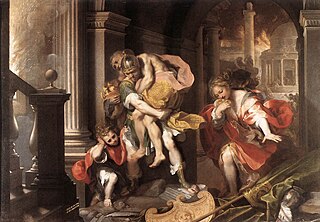
The Aeneid is a Latin epic poem, written by Virgil between 29 and 19 BC, that tells the legendary story of Aeneas, a Trojan who fled the fall of Troy and travelled to Italy, where he became the ancestor of the Romans. It comprises 9,896 lines in dactylic hexameter. The first six of the poem's twelve books tell the story of Aeneas' wanderings from Troy to Italy, and the poem's second half tells of the Trojans' ultimately victorious war upon the Latins, under whose name Aeneas and his Trojan followers are destined to be subsumed.

The tale of the founding of Rome is recounted in traditional stories handed down by the ancient Romans themselves as the earliest history of their city in terms of legend and myth. The most familiar of these myths, and perhaps the most famous of all Roman myths, is the story of Romulus and Remus, twins who were suckled by a she-wolf as infants. Another account, set earlier in time, claims that the Roman people are descended from Trojan War hero Aeneas, who escaped to Italy after the war, and whose son, Iulus, was the ancestor of the family of Julius Caesar. The archaeological evidence of human occupation of the area of modern-day Rome dates from about 14,000 years ago.
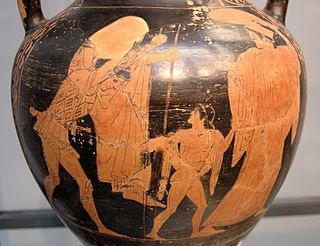
Ascanius was a legendary king of Alba Longa and is the son of the Trojan hero Aeneas and Creusa, daughter of Priam. He is a character in Roman mythology, and has a divine lineage, being the son of Aeneas, who is the son of the goddess Venus and the hero Anchises, a relative of the king Priam; thus Ascanius has divine ascendents by both parents, being descendants of god Jupiter and Dardanus. He is also an ancestor of Romulus, Remus and the Gens Julia. Together with his father, he is a major character in Virgil's Aeneid, and he is depicted as one of the founders of the Roman race.

In Roman mythology, Evander was a culture hero from Arcadia, Greece, who was said to have brought the Greek pantheon, laws, and alphabet to Italy, where he founded the city of Pallantium on the future site of Palatine Hill, Rome, sixty years before the Trojan War. He instituted the festival of the Lupercalia. Evander was deified after his death and an altar was constructed to him on the Aventine Hill.
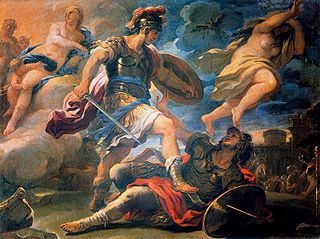
Turnus was the legendary King of the Rutuli in Roman history, and the chief antagonist of the hero Aeneas in Virgil's Aeneid.

In Roman mythology, Lavinia is the daughter of Latinus and Amata, and the last wife of Aeneas.
According to Roman mythology, Amata was the wife of Latinus, king of the Latins, and the mother of their only child, Lavinia. In the Aeneid of Virgil, she commits suicide during the conflict between Aeneas and Turnus over which of them would marry Lavinia.
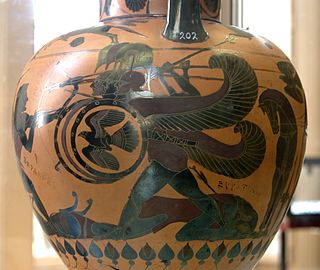
In Vergil's Aeneid, Erulus is a king of Praeneste. At birth, he was given three souls (animae) by his mother, the goddess Feronia, who also tripled his ability to defend himself by giving him three sets of arms.
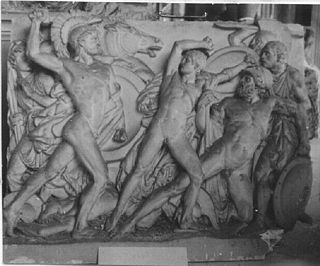
In Roman mythology, Mezentius was an Etruscan king, and father of Lausus. Sent into exile because of his cruelty, he moved to Latium. He reveled in bloodshed and was overwhelmingly savage on the battlefield, but more significantly to a Roman audience he was a contemptor divum, a "despiser of the gods."
Pallantium was an ancient city near the Tiber river on the Italian peninsula. Roman mythology, as recounted in Virgil's Aeneid for example, states that the city was founded by Evander of Pallene and other ancient Greeks sometime previous to the Trojan War. In addition, Dionysius of Halicarnassus writes that Romans say that the city was founded by Greeks from Pallantium of Arcadia, about sixty years before the Trojan war and the leader was Evander. Solinus writes that the Arcadians were the founders of the city.

The kings of Alba Longa, or Alban kings, were a series of legendary kings of Latium, who ruled from the ancient city of Alba Longa. In the mythic tradition of ancient Rome, they fill the 400-year gap between the settlement of Aeneas in Italy and the founding of the city of Rome by Romulus. It was this line of descent to which the Julii claimed kinship. The traditional line of the Alban kings ends with Numitor, the grandfather of Romulus and Remus. One later king, Gaius Cluilius, is mentioned by Roman historians, although his relation to the original line, if any, is unknown; and after his death, a few generations after the time of Romulus, the city was destroyed by Tullus Hostilius, the third King of Rome, and its population transferred to Alba's daughter city.

In Roman mythology, Pallas was the son of King Evander. In Virgil's Aeneid, Evander allows Pallas to fight against the Rutuli with Aeneas, who takes him and treats him like his own son Ascanius. In battle, Pallas proves he is a warrior, killing many Rutulians. Pallas is often compared to the Rutulian Lausus, son of Mezentius, who also dies young in battle. Tragically, however, Pallas is eventually killed by Turnus, who takes his sword-belt, which is decorated with the scene of the fifty slaughtered bridegrooms, as a spoil. Throughout the rest of Book X, Aeneas is filled with rage (furor) at the death of the youth, and he rushes through the Latin lines and mercilessly kills his way to Turnus. Turnus, however, is lured away by Juno so that he might be spared, and Aeneas kills Lausus, instead, which he instantly regrets.

Tiberinus is a figure in Roman mythology. He was the god of the Tiber River. He was added to the 3,000 rivers, as the genius of the Tiber.
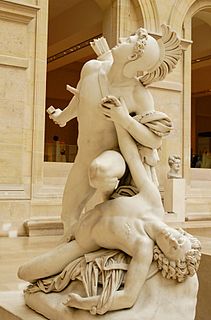
In Greek and Roman mythology, Nisus and Euryalus are a pair of friends and lovers serving under Aeneas in the Aeneid, the Augustan epic by Virgil. Their foray among the enemy, narrated in book nine, demonstrates their stealth and prowess as warriors, but ends as a tragedy: the loot Euryalus acquires attracts attention, and the two die together. Virgil presents their deaths as a loss of admirable loyalty and valor. They also appear in Book 5, during the funeral games of Anchises, where Virgil takes note of their amor pius, a love that exhibits the pietas that is Aeneas's own distinguishing virtue.
In Roman mythology, Fabius was the son of Hercules and an unnamed mother.
The Sortes Vergilianae is a form of divination by bibliomancy in which advice or predictions of the future are sought by interpreting passages from the works of the Roman poet Virgil. The use of Virgil for divination may date to as early as the second century AD, and is part of a wider tradition that associated the poet with magic. The system seems to have been modeled on the ancient Roman sortes as seen in the Sortes Homericae, and later the Sortes Sanctorum.
When writing the Aeneid, Virgil drew from his studies on the Homeric epics of the Iliad and the Odyssey to help him create a national epic poem for the Roman people. Virgil used several characteristics associated with epic poetry, more specifically Homer's epics, including the use of hexameter verse, book division, lists of genealogies and underlying themes to draw parallels between the Romans and their cultural predecessors, the Greeks.
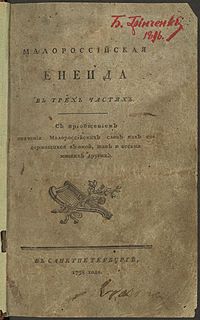
Eneida is a Ukrainian burlesque poem, written by Ivan Kotliarevsky in 1798. This mock-heroic poem is considered to be the first literary work published wholly in the modern Ukrainian language.
















